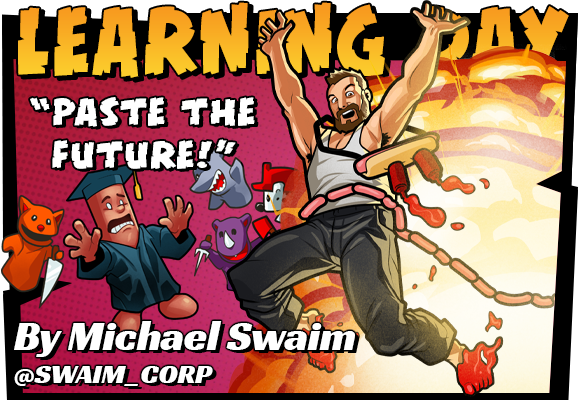
The year is 199x, like a fucking Megaman game. The city seethes. Deep in its night-guts, young Pepe Moreno works feverishly, putting the finishing touches on a dark magnum opus he’ll unleash like a torrent, like a vision, like the future. It’s done. The comic book sits before him, complete, coiled like an ancient thing of power forged by some half-mad god. How to crown this King of Comics? How do you countenance the divine? Perchance with a pattern lifted from the side of a trapper keeper.

Look at that logo for a second. Every single thing about the word “Batman” that can be batted has been batted. There’s both a trademark AND a registration mark, like two great chains struggling to contain the whirlwind force of what happens when the Dark Knight meets cutting-edge technology. This is the future of comics. This is Digital Justice. Speaking of which, Digital Justice would be a good name for a really rough prostate exam. “Remember me, asshole?” BAM! Jam it right in there.
Hi! I’m Michael!
Today on the column, I got sick of writing about things my Dad gave me or left around the house, so I decided to track down a half-remembered comic from my childhood that I assumed I’d bought or shoplifted somewhere like a certified bad boy. When I found it as difficult to finger as a rough prostate exam, I eventually mentioned to my Dad, among other people, that I was looking for it. He quickly rifled through a stack of comics and handed it over. So today, we’re covering a half-remembered comic from a half-remembered childhood that it turns out my Dad gave me or else left around the house. Someday that well will run dry, but not now.
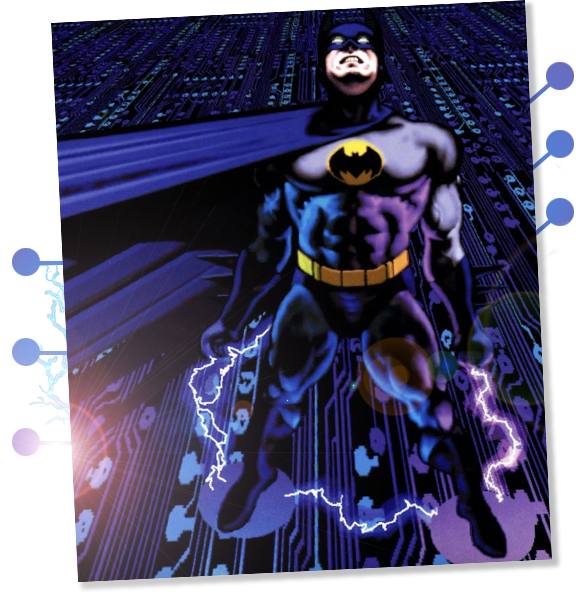
Batman: Digital Justice is what happens when someone’s nephew explains to them what computer graphics are and, through a series of tragic miscommunications, that results in an executive paying some visionary to make a proof-of-concept for how amazing new tech can eliminate the need for human workers. By using cutting-edge CG (ie, vector art, copy-and-pasting a lot, and applying a handful of Photoshop filters), its creator Pepe Moreno hoped to take Batman, and comics, to their next stage of evolution. This wasn’t just a comic book, it was a movement, and that’s not me saying that, it’s the book jacket.
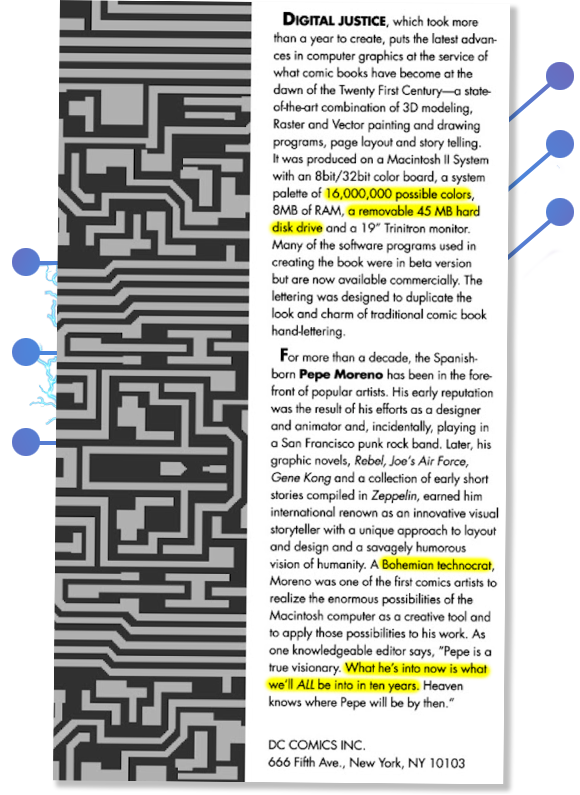
Key lines in there include “took more than a year to create,” “produced on a Macintosh II with 8MB of RAM,” and “a true visionary…what we’ll ALL be into in ten years.” At this juncture, it’s important to me personally for you to understand that this is Pepe Moreno, posed in a shot he helped stage and with which he’s proud to be associated.
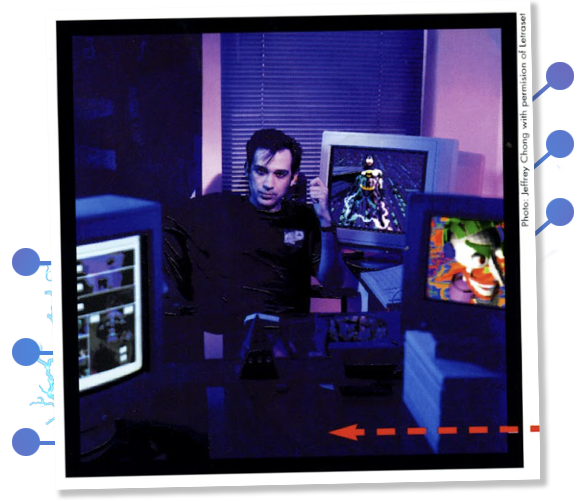
He’s the Joker, baby, with a little Criss Angel mixed in. And with that image, you’ve seen maybe 14% of all the art assets you will encounter in this fairly short comic that took one man over a year to create. Big red flags right off the bat (see what I did there? [see how I belabored it there?]):
1: Batman standing on a circuit board trapped by electricity, implying a story about Batman being sucked into a computer, the most rote take on CG possible.
2: The need to write “COMPUTER GENERATED” on the cover in police tape like it’s a warning.
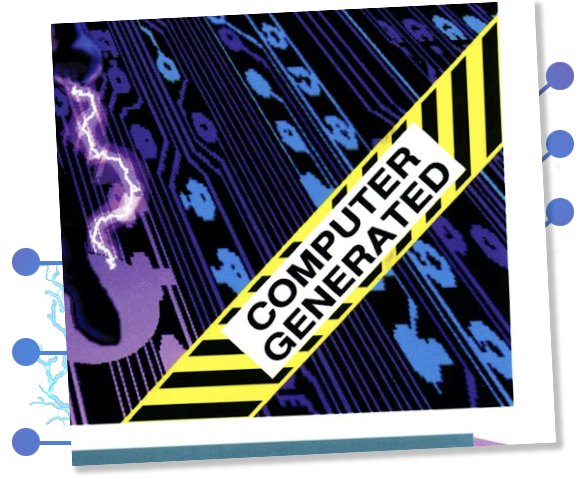
“Look out! Step back, ma’am, it’s computer generated!” In this standalone comic book produced, illustrated, written and designed by Pepe Moreno, there is a two-page spread that’s a bio of Pepe Moreno. I can’t bring myself to read all the way through it, but I do like the additional image of him as B.J. Novak’s decapitated head floating in a void with two arrows he put there pointing at his own face.
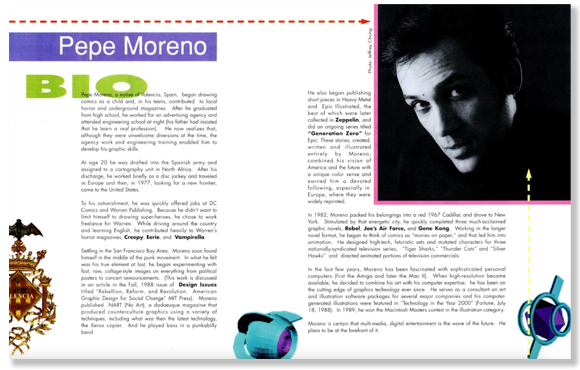
The point is, Pepe really called his shot here. This comic’s going to be visionary, combine cutting-edge art tech in new ways, and pave the way for the kinds of comics we’ll all be reading by the year 20xx. On the other side of the book jacket that he also wrote himself, Moreno says the book will be compared to Brave New World, 1984, the works of Philip K. Dick, and Bladerunner. “Although it has elements in common with some of this,” opines Pepe, “it is something more.” Got it. I’m buckling the fuck in, whatcha got? Shit, it’s another two-page spread where a friend of yours says you’re a visionary, fuck me.
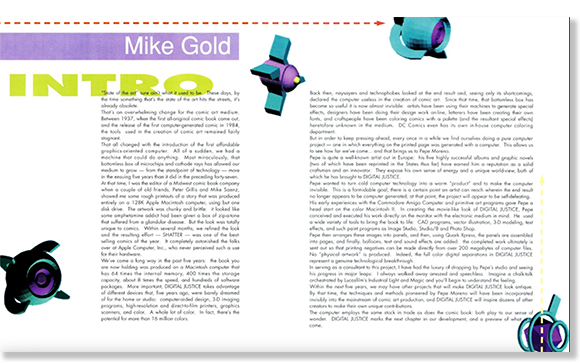
Literally all you need to glean from that is “DIGITAL JUSTICE marks the next chapter in our development.” Pepe isn’t just pointing at the stands, he’s showing the catcher a flipbook he did of himself getting homerun head from the pitcher’s wife.
Anyway, it’s a bunch of circuit board clipart stretched out with some CG blobs overhead:
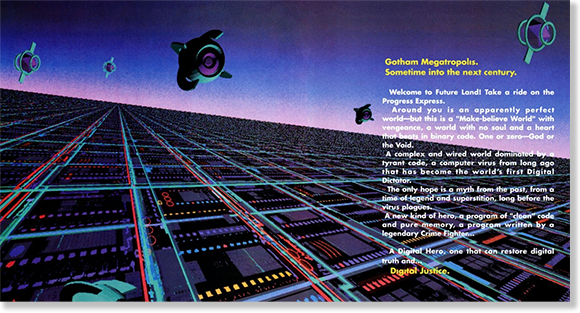
It looks like Reboot season three, before they got the graphics upgrade and Enzo lost his eye. The next page is a Sonic the Hedgehog Level Start screen with “Chapter 1” written on it instead of “Green Hill Zone.”
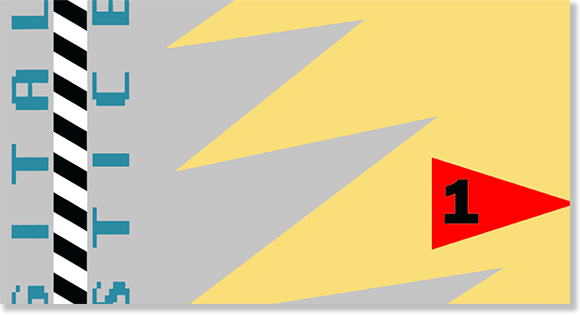
And then, at long last, we get to see what it’s all about: humans. Humans rendered in such exquisite detail one must be careful not to fall in love with them.
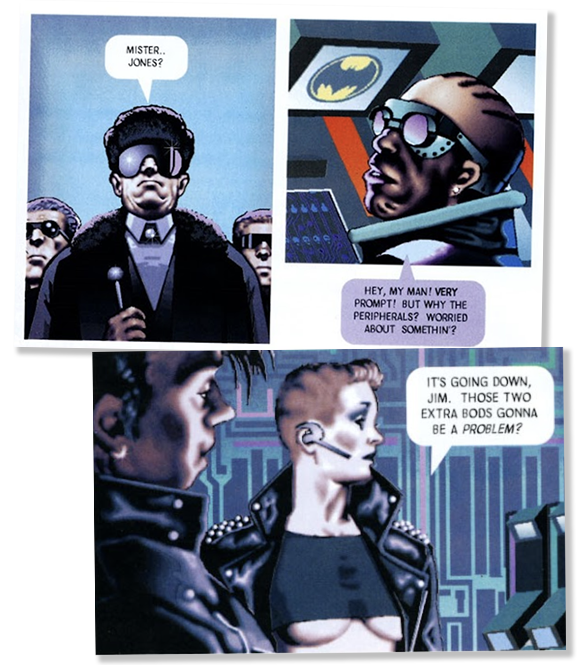
Somehow, that female police officer’s shirt is showing underboob but also so tight that she has clear cleavage-valley. I feel like her underboob should be way more pancaked out, right? I mean are we using a Macintosh II here or aren’t we?!
Incidentally, please note that Mister Jones is playing a Batman arcade game, despite the fact that the whole plot of this comic is Batman has been completely forgotten by Gotham, and Gordon’s grandson has to revive his legend. My point is, it’s also a bad comic, but you can just trust me on that point. We’re here for terribly rendered underboob and we don’t gain anything by pretending that isn’t the case.
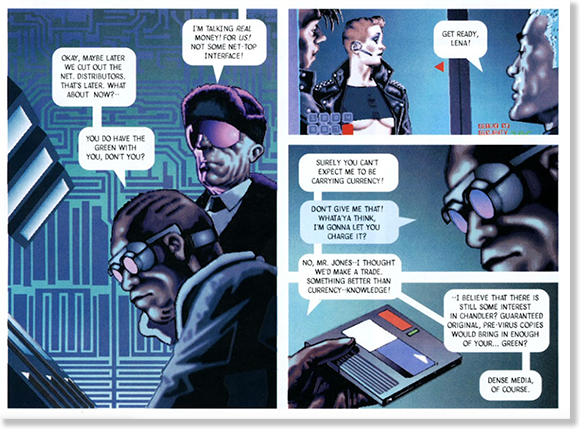
If underboob is copy-pasted infinitely, is it really more underboob? Is there a reason they’re using a thicc floppy disc in the distant future? These are questions for the great philosophers, not I. I am but a humble joke-merchant, idly comparing ’90s Batman comics to point-and-click adventure games because I can only tell the truth.
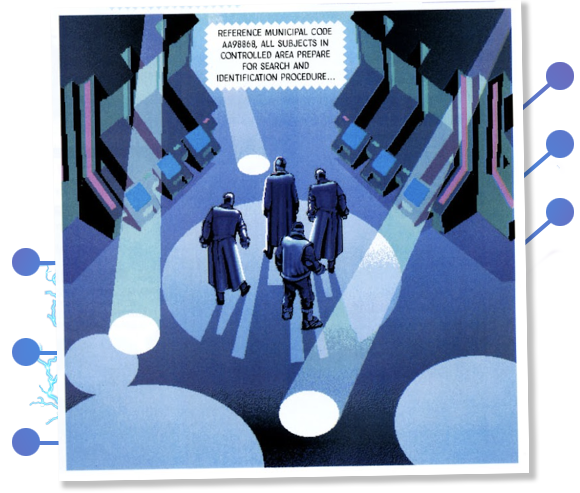
Tell me you don’t look at that image and want to click a little cursor to make the guys walk around and use items on things in sequence until the thirty-eighth item works for no logical reason. But while the wide shots are point-and-click, the gore is decidedly Duke Nuke ‘Em.
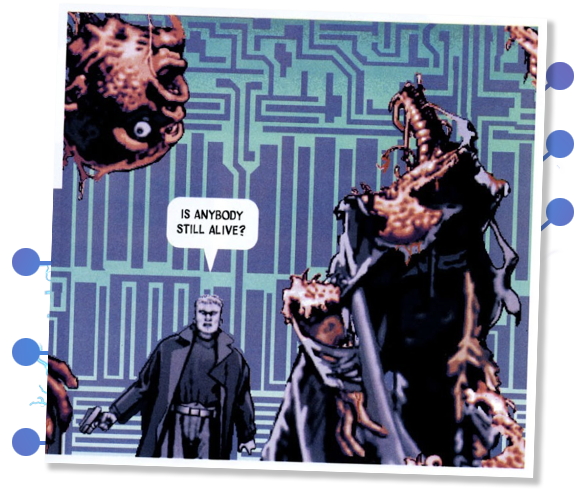
I guess even computers hate generating backgrounds, because about 60% of the panels in this book just have circuit board wallpaper behind them. And in case you haven’t caught on, almost every single art asset is juiced for at least two or three panels. That CTRL-C-V loop can become an addiction, man. Ask A.I. No, don’t, it learns more when you ask it stuff, just leave it alone.
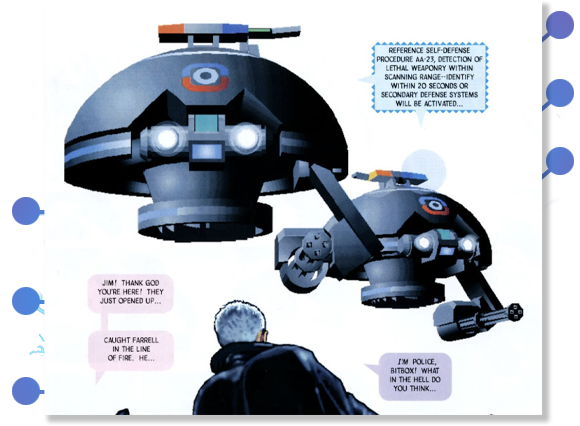
As for the plot, it follows not-Batman for a whopping third of the story, and instead focuses on Jim Gordon’s grandson, which places this timeline somewhere in, like, 2060, which is pretty quick for us to turn the current Earth into a neo-dystopian surrealscape. But hey, I wouldn’t put it past us; we do a lot of dumb shit.
Gordon’s on the case of a bunch of rogue cop-bots equipped with no other way to interact with the world but a siren and a minigun, because cops. Young Boston Dynamics engineers surely drooled over this panel of what looks like a couple roombas with cigarette lighters on the bottom of them.
The writing is forever burdened by the need to be “futuristic” and prove it’s up with the new hip terms the teens are using, like “email,” whatever that is.
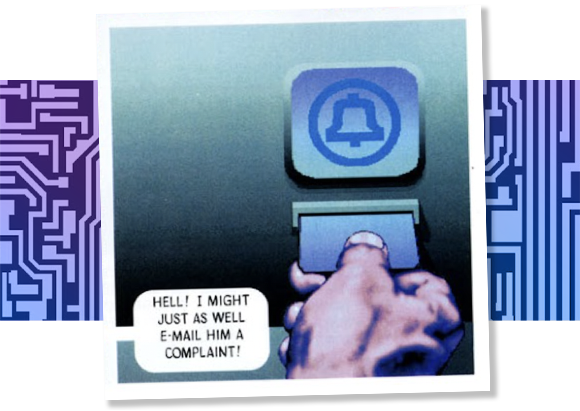
Naturally, it all goes down smoother with some made-up near future lingo as a chaser. What’s funny is without the future lingo, Gordon talks exactly like a ’70s beat cop.
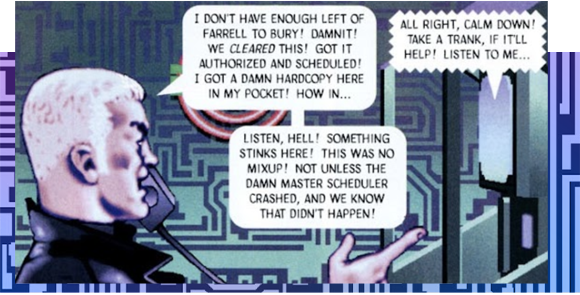
Honestly, for me the use of “trank” isn’t as bad as the decision to spell “dammit” as “damnit,” which is what you say when a nit has wronged you. Blink-182 understood this, why not Pepe Moreno?
This mix of old-speak and new-speak climaxes with an altercation Gordon has with some young toughs in his apartment building hallway. Drown in this gabble of nonsense!
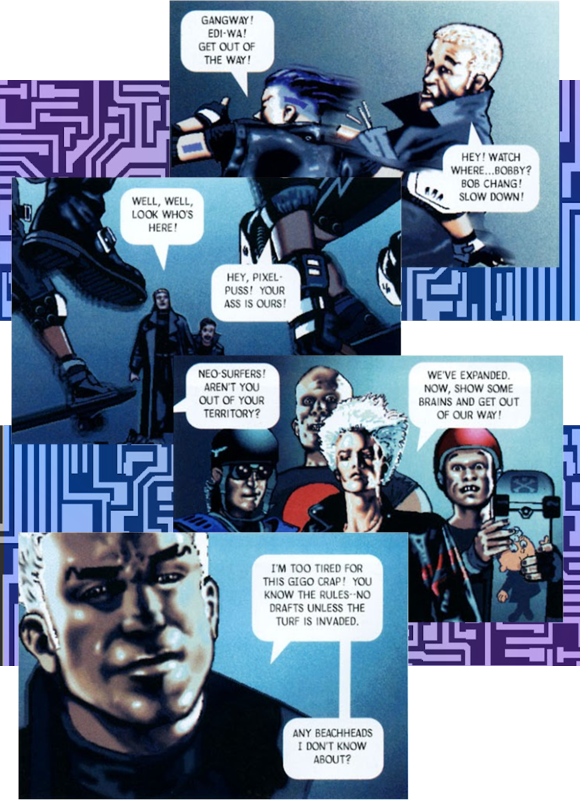
Edi-wa, pixel-puss, neo-surfers, gigo, drafts, beachheads… these terms crash upon my brain’s stupidity gland like a pixelated wave upon a shore of Neuromancer paperbacks. I hope Gordon beats the crap out of those punks, especially the one that looks like Billy Idol, although I pray he’ll go easy on the one that looks like Flea.
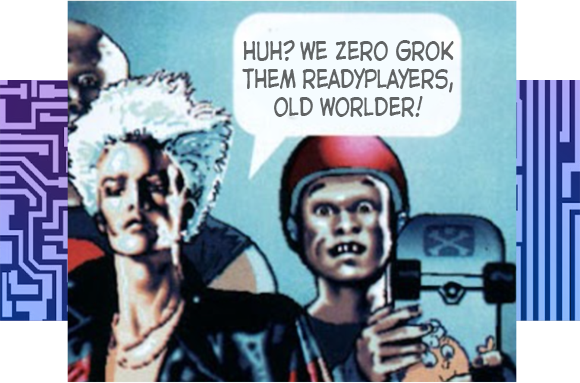
As it meanders its way through a pretty generic neo-noir story for the first half, the comic does trip over a few predictions that hit uncomfortably close to home, chiefly the one about a resurgence of laughable Nazis making life horrible for everyone while totally misinterpreting their own dogma like ignorant shitheads.
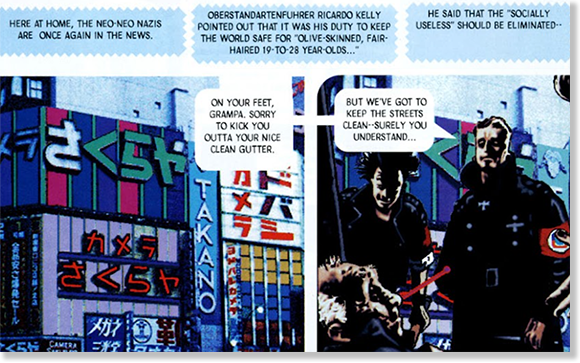
Of course, it also predicts that the greatest pop star of the future will be this woman Gata, so don’t go calling it Nostradamus.
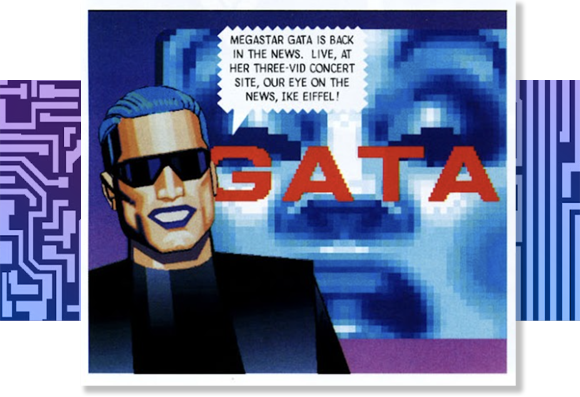
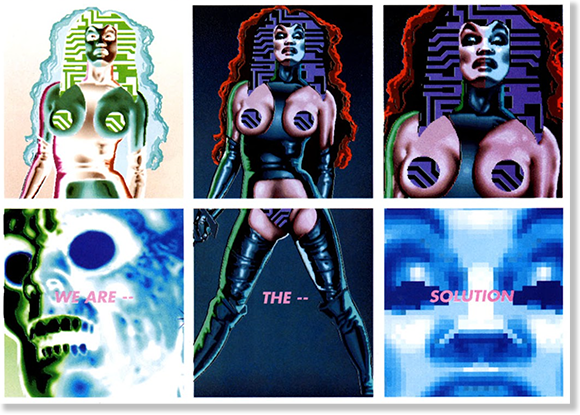
Excuse me, are your titties wi-fi enabled? I was trying to log onto your crotch but it’s asking me for an assword. Yes, when in doubt, titties and circuit boards are the order of the day. If you’re anything like me, you’re probably wondering what the fuck any of this has to do with Batman. The answer comes in the form of a Joker Virus that secretly controls all aspects of the media, military, and politics of the future from behind a cadre of puppet strongmen.
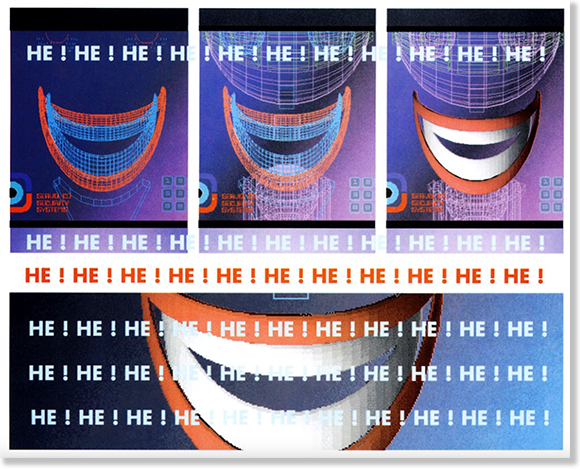
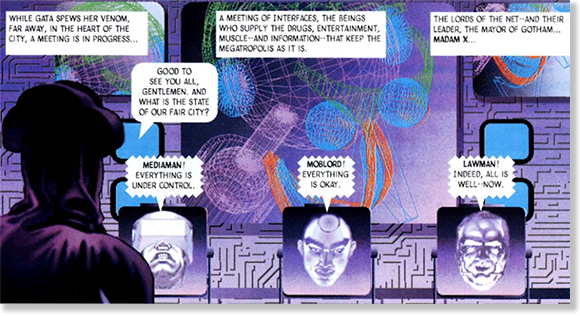
It’s cold and calculating, patiently accruing power over centuries, managing the day-to-day operations of the city with a stern eye– you know, the Joker! Trying to force the Joker into the Big Brother mold was never going to be a perfect fit, but Digital Justice never thought beyond the wireframe Batman and Joker heads that Pepe whipped up one sleepless night. And I say “one” because I refuse to believe it took anyone longer than that to create these monstrosities.
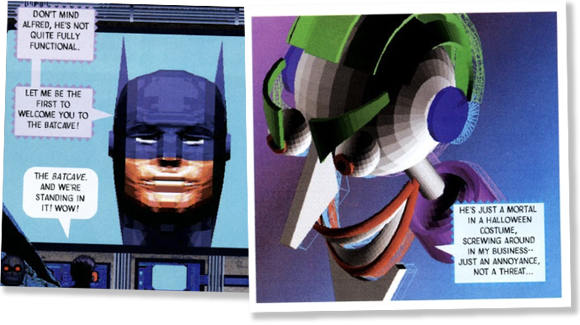
But worse, much worse than the two CG faces that become the focus of the back half of the book, are Pepe’s attempts at rendering normal human faces, something I thought comics had already mastered long ago. Every single character in this book owns nadir-adjacent real estate in the uncanny valley.
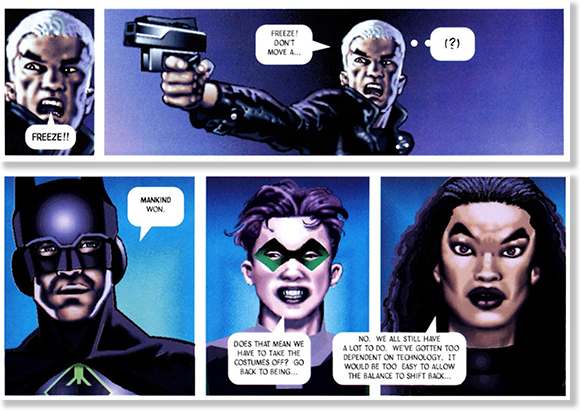
Eventually Gordon dons a futuristic batsuit with the help of a Batman program Bruce Wayne authored before his death. Immediately realizing the point of the book and their lives, every other existing character then takes on the persona of someone from the Batman mythos – Gata becomes Catwoman, a young skate-ninja from Gordon’s building becomes Robin, and so on. The best iteration has to be a little C-3PO droid programmed to act like Alfred the butler, because O.G. Batman demanded his slaves be buried with him when he died. I choose to believe Alfred’s psyche was violently ripped from him and trapped in the machine.
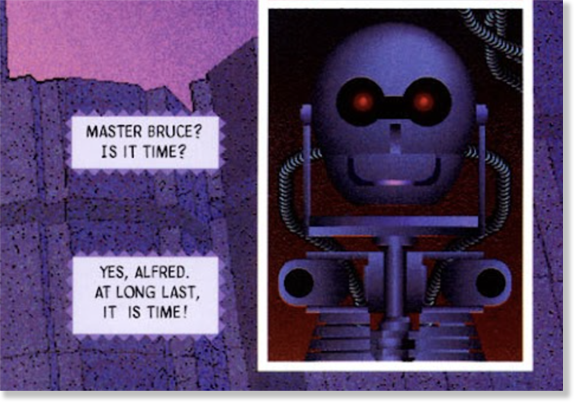
Gordon takes on the responsibility of dismantling his corrupt society single-handedly via a series of low-level street skirmishes. He quite hilariously gets his ass handed to him by two of the floating servo-cops his first night out, and they proceed to STAB HIM THROUGH THE THROAT with electrified spikes of some kind. Batman sleeps it off and this is never brought up again.
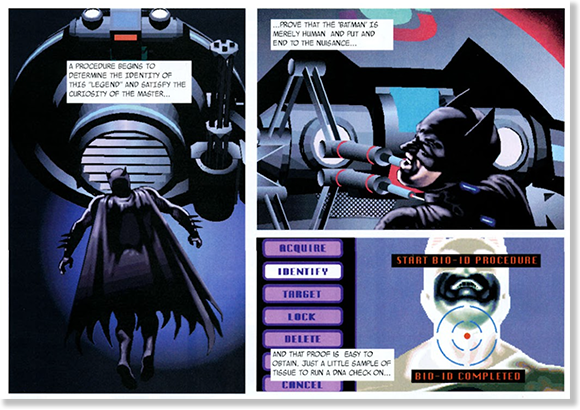
Eventually he gets better, and we get a montage of news clips trying to establish that the spirit of vigilante justice is back in a big way. This is accomplished by hitting the paste button more often than a graphic designer trying to add diversity to a college campus brochure.
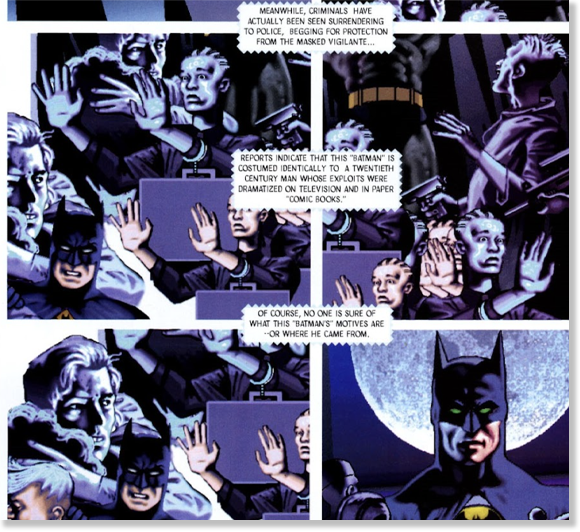
Ultimately, the new super team goes on a rampage, straight-up murdering the city’s power brokers in a move that can only have thrown the entire society into chaos. First there’s Kabuki-bot –
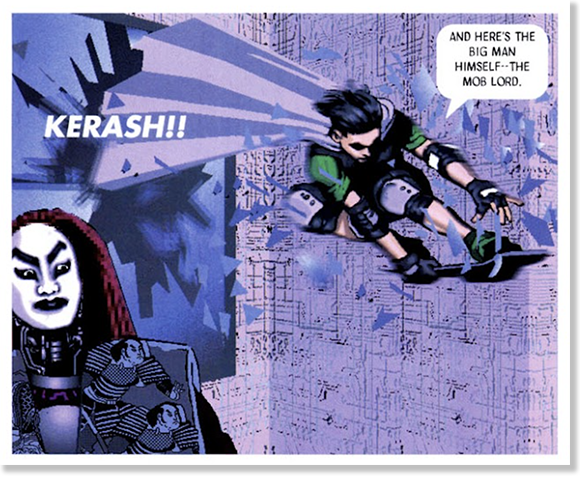
– then Jukebox Architect –
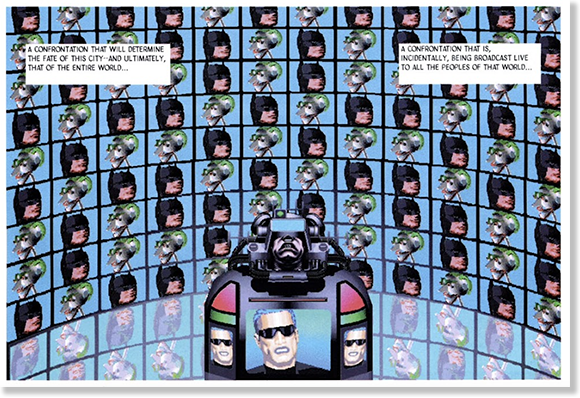
– and finally the mayor herself, who turns out to be a clone of Gata for no reason whatsoever. It adds nothing to the plot but needless suffering as our newly-anointed Catwoman watches the closest thing she has to family choke to death on green slime.
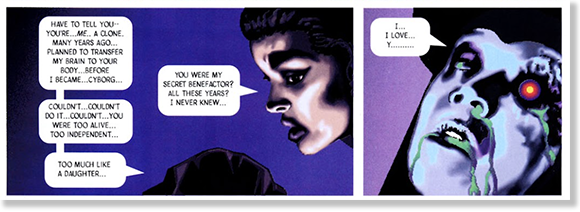
Digital Batman fights the Joker Virus, who ultimately – you guessed it – sucks Gordon into cyberspace, where it enslaves him with some spiffy digital lightning, then shows him Bruce’s key memory of watching his parents get shot.
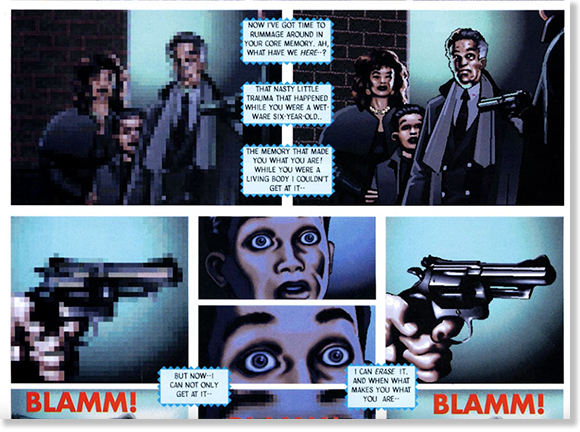
This is neither here nor there, but Pepe always writes gunshot sounds with an extra M and it really bothers me, damnit. The fight between the two CG heads is largely a philosophical discussion, in the sense that shit your roommate drools at you at four in the morning after a night of Jäger bombs is a philosophical discussion. The Joker calls himself a true visionary and artist, just like Pepe, then proceeds to show us exactly the kind of art that produces.
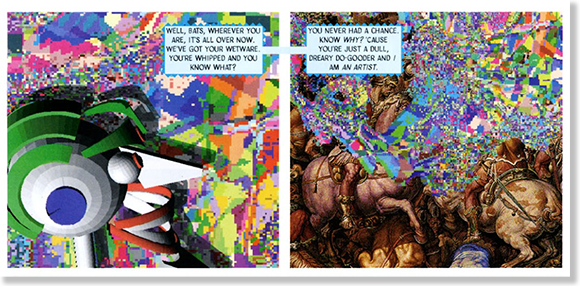
That looks like Kid Pix threw up. It makes my eyes bleed little CG cones. Please stop, Joker Virus. I understand that you are the future, just please stop with the graphics.
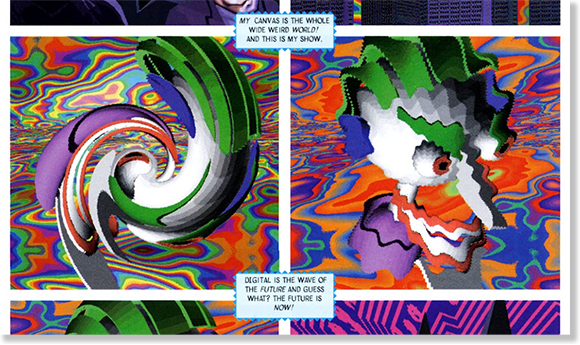
Finally Alfred hits Batman’s head with some sweet Bat-code and all is well again.
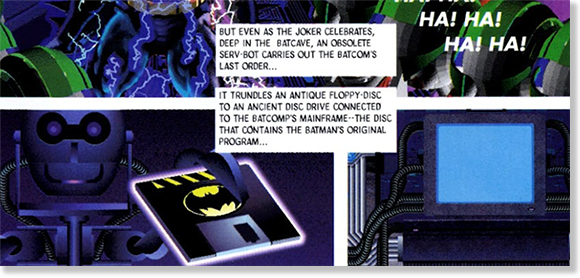
And I can think of no more fitting a final image for Pepe Moreno’s cutting-edge, visionary take on the future of comic books than an old man cramming a floppy disc into a computer with a CRT monitor and terrible cable management. In the end, it was less Batman: Beyond and more one man’s fever-dream of a whole branch of terrible edgelord CG comics we could have had. Thank you Pepe. Thank you for showing us what might have been, if only we’d been a little more accepting, and had a little worse taste.
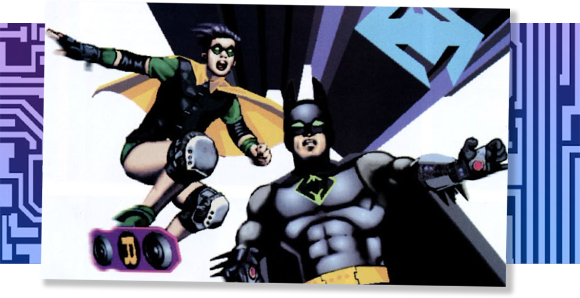
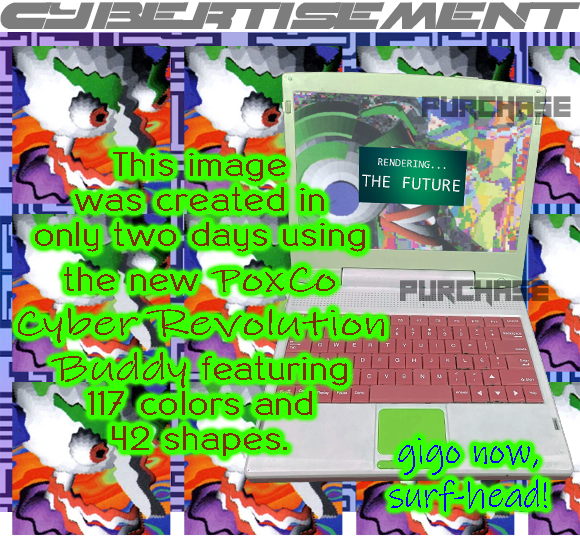
This article was brought to you by our fine sponsor and Hot Dog Supreme: Dusty’s Rad Title, who is currently doing what we’re all going to be doing in 10 years: spending an inordinate amount of money on hot dogs.

5 replies on “Learning Day: Batman Digital Justice 🌭”
Say what you will about Pepe’s writing abilities but I would kill to have an author photo like that out in the world.
See, I bet this actually took him a long time simply because he didn’t know what he was doing and didn’t particularly want to learn beyond the experience of ponderously zooming in to fuck up images pixel by pixel.
On the other hand, I remember this being discussed in the last section of a history of batman anniversary thing DC put out when I believe I was still a teenager and immediately concluding it looked like shit.
Give him credit, though: computer coloring, fuzzy edges, unnecessary Photoshop filters, weird lightboxed faces, and writers mostly still not really having a working idea of what computers were is *exactly* what comics would be like ten years later.
Marvel did this too at the time with Iron Man, I think it was call Crash or something, it also kinda sucked, but in a less interesting way.
Sometimes it’s cruel and unfair to look back at stuff from the ’90s that was meant to be “cutting edge”, or a “vision of the future”…
Then sometimes you see something like this and think:
“Nope. That sucked ass even when it was new.”